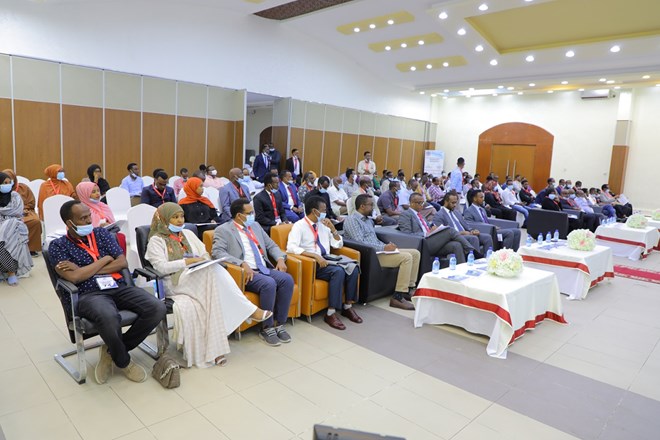6-7 November 2020 | Mogadishu, Somalia
We come together at this National Employment Conference as representatives of the Federal Government of Somalia, Federal Member States, Somali Chamber of Commerce & Industry (SCCI), Federation of Somali Trade Unions (FESTU), private sector entities, Academic and Non-governmental Organisations to respond to serious unemployment challenge facing the country.
During the two-day conference, the participants have been engaged in intensive discussions in a spirit of cooperation and consensus building to address a problem that affects all of us and to craft an agreement that directly addresses the unemployment crisis.
Unemployment remains far higher than in any comparable country in the world, and as a consequence poverty is widespread, and we now have world-record levels of inequality. It is essential that we urgently adopt a completely new growth path to transform our economy into one based on labour-intensive industry and one that meets the basic needs of our people.
The participants of the National Employment Conference have agreed:
- That Somalia still confronts formidable development challenges including pervasive poverty, food insecurity, massive illiteracy, unemployment and health risks, which have been heightened by the COVID-19 pandemic and the lack of access to basic services.
- That the current level of poverty and inequality are unacceptable and new initiatives are needed to promote improved quality of life and decent work opportunities. The participants further agreed that the current unemployment, job losses and lack of job creation, constitute a deepening crisis in Somalia that requires urgent action.
- That the unemployment crisis necessitates the labour market stakeholders to focus not only on the creation of jobs but also on the imperative to address the crisis of job losses. We have agreed that everything possible must be done to avoid job losses in the Private Sector. Doing so requires boldness, resolve, innovation, collaboration and creativity.
- That Somali economy needs to be transformed to meet the needs of all of our people as growth on its own is insufficient to solve our unemployment problem. We need to expand the capacity of the economy to grow sustainably as the country needs a growth that is more labour absorbing.
- To work towards a country that is a hub for investments and promotes the fair treatment of workers through ensuring compliance with the national and international law. To this end, we agree to jointly support the realisation of decent work through the validation and implementation of Decent Work Country Programme.
- That drastically increasing investment levels is critical to defeating unemployment and growing the economy in order to ensure that there is an equitable distribution of income and that more people are allowed to participate in the economy with decent jobs.
- Establish national stakeholders forum/ council including private sector, acedemic institutes and international partners to promote and enhance effective collaboration and harmonisation for generating decent employment for Somali people.
- To work collaboratively to increase commitments and interventions to support employable people to have the competencies needed for employment and self-employment such as TVET programs so that they can improve their quality of life, progress into other postschool institutions, improve chances of finding work, and start and sustain businesses.
- To explore opportunities for resources and processes to support building more inclusive and cooperative workplace engagements between workers and employers to solve workplace problems.
- Given the critical need to support young people into jobs. The Ministry of Labour and Social Affairs will build a new innovative Employment Service Centre that will deliver employability services such as job matching, start ups, training and more to citizens seeking jobs.
END

